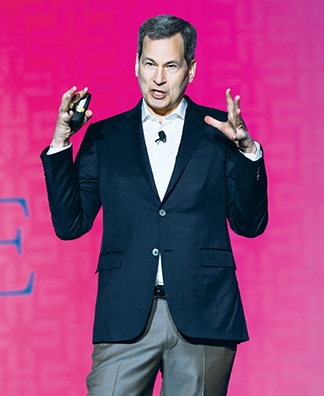By JULIE MINDA
Technology and science journalist David Pogue said during a June 6 presentation at the Catholic Health Assembly that advancements happening at the intersection of technology and health are giving people instantaneous, convenient and sometimes lifesaving insight into the state of their health.
"It's going to be a wild ride," he said of all the advancements in health technology such as smart watch applications that can diagnose COVID-19 and flag heart arrythmias. Pogue is a CBS "Sunday Morning" correspondent and a host of PBS' "NOVA."

Pogue began his presentation marveling over the power that smartphones and other consumer devices have given to people around the world.
He said that while the ability to manipulate toilet paper roll holders, doggie treat dispensers and garage doors from a smartphone won't change society, other technologies may. He spoke of the state of development of self-driving vehicles and wondered how long it will be until robo-taxis are commonplace.
Pogue said telehealth exploded during the pandemic, allowing patients to access care without risk of contagion. Telehealth has an added advantage of enabling doctors to see into the patient's home environment and "it's a natural for mental health visits," he said.
While many people appreciate how telehealth can improve access, many patients and doctors remain skeptical. "You can't touch someone over video," he said.
Also, not everyone has access to basic internet let alone high-speed broadband.
Wearables
Pogue said many innovations are happening in the area of wearables, such as the Fitbit and Apple Watch.
In addition to monitoring heart rate and oxygen saturation, smart watches can flag potential disease or danger. "The Apple Watch knows when you have fallen and can send alerts to people you tell it to," Pogue said. It notifies wearers of irregular heart rhythms.
Pogue said Stanford University researcher Michael Snyder created a smart watch algorithm that was able to detect 80% of COVID-19 cases before symptoms occurred.
"If the government had given us all Apple watches for free, we could have cut the pandemic in half," Pogue mused.
Pogue said personal health data from wearable technology is giving patients more agency in their relationship with clinicians.
All this personal health data on one's wrist can pave the way for more engaged patients and better outcomes from treatment. "The research you've done can save your doctor time. Don't go it alone," Pogue advised, "work with your doctor."
